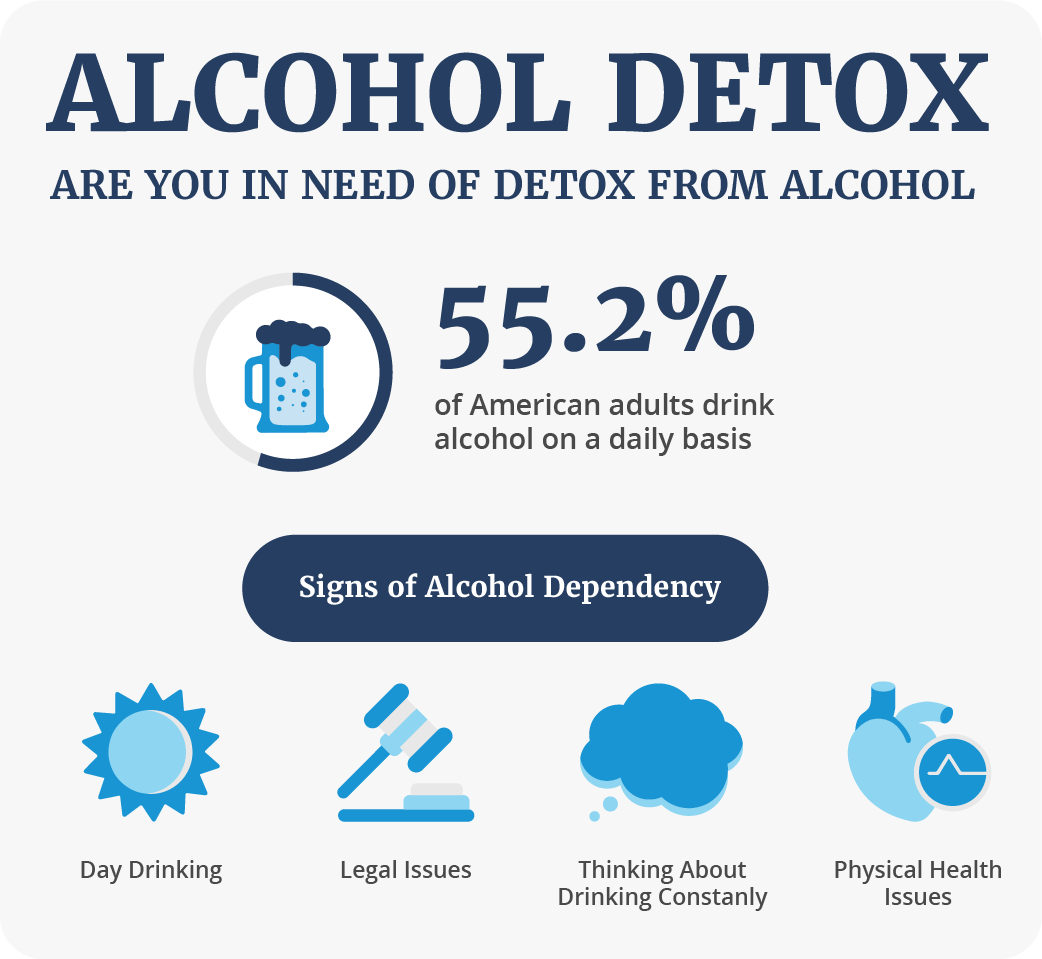Alcohol Detox in New Jersey
Alcohol detox can vary from mild to severe. Mild symptoms may include things like anxiety, restlessness, and stomach problems.
In the state of New Jersey, alcohol addiction continues to be a prevalent problem, causing damage to citizens’ physical, emotional, and mental health. To combat this widespread issue, our alcohol detox in New Jersey offers a comprehensive approach to help individuals overcome their dependency on alcohol and start on the path toward recovery.
With professional care and support, those struggling with alcohol addiction can find hope and healing at our drug or alcohol detox in New Jersey. If you or someone you care about is facing challenges with alcohol, there is a solution. The compassionate and knowledgeable team at Discovery Institute in Marlboro, New Jersey is dedicated to assisting you in breaking free from the cycle of alcohol addiction. Our exceptional treatment services are based on scientific research and delivered with empathy.
Once you arrive, our expert medical and clinical staff will oversee the alcohol detoxification process. They will support you in navigating the physical and psychological discomfort of withdrawal and guide you toward the subsequent stages of treatment.
While the severity of alcohol withdrawal symptoms can vary, you do not have to endure them alone. The team at our medical detox clinic in New Jersey will employ all available methods to alleviate your symptoms as comfortably as possible. You do not have to embark on your journey towards sobriety alone. Learn how our addiction treatment services can help you or a loved one.
Our Alcohol Detox Process
We know that alcohol withdrawal symptoms are uncomfortable for patients. So we provide them with prescription and over-the-counter medications to treat the less dangerous, but still uncomfortable aspects of detox, such as nausea. We also provide comfortable beds for patients to rest, as many of our clients need long periods of sleep during this time.
Nutritious, appealing meals are provided for patients, helping them to re-establish healthy eating routines that will serve them in their recovery journey. If you are looking for an ideal intensive outpatient alcohol rehab, Discovery Institute is one of the most exceptional intensive outpatient treatment programs for substance use. We excel in alcohol treatment detox centers in New Jersey.

The Unmet Need Of Receiving Addiction Treatment
The sad reality of addiction treatment at detox centers is that addiction is a chronic lifelong disorder. However, it is treatable. While this treatment was never promised to be easy, it is the far easier solution to living a lifelong addiction while attending remarkable treatment. About 40% of people who need treatment did not receive it. This is a very common occurrence, and a gap in the healthcare field that we here at Discovery Institute in Marlboro, NJ we’re trying to close.
If you or a loved one struggles with an alcohol abuse disorder, please get help and seek treatment. You have an illness that can be treated, but you have to be open to having that illness tended to. Please consider getting treatment today. At the Discovery Institute, we are here for you for all the needs you have, including health insurance.

When Is An Alcohol Detox Treatment Program Necessary?
Medical detox for a substance use disorder such as alcohol addiction is necessary when an individual is unable to control the amount they drink and may drink daily or binge on high quantities of alcohol. While many people do not feel like they need alcohol detox, it may be necessary to conquer addiction. Alcohol and drug-related substances are some of the most socially acceptable, prevalent substances used in our society.
For most people who do not have alcohol use disorder, drinking can be done socially and casually, for special occasions, or on the weekends. Individuals must determine for themselves whether or not they are dependent upon alcohol or substance use to function normally, but there are some red flags that concerned individuals, their family members, and loved ones can watch out for, which may indicate an alcohol dependence problem. These include:
Signs and Symptoms Of Alcohol Addiction
- Regularly consuming more alcohol than you had planned on drinking
- Drinking during the day or work hours
- Attempting to hide how much or how often you are drinking
- Experiencing frequent blackouts or memory loss from drinking
- Feeling uncomfortable or uneasy when alcohol is unavailable
- Experiencing legal, financial, or emotional consequences from drinking
- Being unable to take a break from drinking or control the amount you drink even when intending to do so
- Having tremors or shakes when not drinking
- Binging heavily
- Experiencing cravings for alcohol
- Thinking about alcohol excessively
- Drinking and operating a car or heavy machinery, or otherwise attempting dangerous tasks while intoxicated
- Drinking alone
- Feeling guilty about your alcohol consumption
- Physical changes, such as gastrointestinal problems
Am I An Addict?
Think you may have an addiction problem? Have you ever asked yourself “am I an addict?” Discovery Institute in Marlboro, New Jersey offers various levels of care for people with mild to severe substance use issues. There is no time to wait with addiction. If you are questioning your habits regarding substance use, call us today for support.
What to Expect During Alcohol Detox
Since the alcohol detox process can be difficult, our dedicated and compassionate staff is available around the clock to clients to make sure their every need is met, along with helping with any questions regarding health insurance and so forth. At all times during their stay, patients will have access to medical professionals who can:
- Address any concerns they may have
- Adjust any treatment regimen as necessary
- Discuss health insurance needs
Since we administer medication to assist with the detox process, our doctors are also trained to assess patient progress, and their symptoms. Our staff understands that oftentimes, patients enter detox with outside physical and mental health concerns. We are experienced in identifying and treating these issues alongside alcohol withdrawal symptoms in our patients. We aim to provide the best chance at a full recovery for our clients.
In addition, we know that detox can be an emotionally charged and challenging time for many patients, so we have an amazing staff of therapists available to attend to each client’s needs. If you have any questions about health insurance, we can help you. We are available.

You’ll feel safe and comfortable during the alcohol detox process.
Alcoholism in New Jersey: An Overview
Alcohol remains a psychoactive substance that poses a substantial threat to public health, resulting in a considerable burden of disease and significant social and economic repercussions. The detrimental consumption of alcohol is accountable for the majority of avoidable fatalities globally and has also been linked to the development of various behavioral and mental disorders.
According to research by America’s Health Rankings of the United Health Foundation, New Jersey ranks 14th in the United States for binge drinking (15.9%). This indicates the percentage of adults who reported binge drinking (four or more drinks for females, or five or more drinks for males on one occasion in the past 30 days) or heavy drinking (eight or more drinks for females, or 15 or more drinks for males per week.

Alcohol use disorder (AUD) remains a significant public health concern, posing risks to both physical and mental well-being, as well as imposing substantial social and economic burdens. In the United States alone, AUD is responsible for over 85,000 deaths each year, with New Jersey (NJ) experiencing more than 1,500 annual fatalities.
Despite the gravity of these statistics, the provision of AUD treatment is uneven across different population groups. Therefore, it is crucial to identify the factors that contribute to this disparity, particularly within specific populations such as NJ, to implement targeted interventions effectively.
At Discovery Institute in Marlboro, NJ, our team of highly qualified addiction specialists provides services and resources such as alcohol detox, to prepare our clients for treatment and address their needs effectively.
Drug And Alcohol Detox Treatment In A Medically Supervised Setting
Alcohol withdrawal syndrome can occur as early as four to six hours after the patient’s last drink, and residual symptoms can last for weeks (although acute symptoms usually subside after one week). Alcohol detox at treatment centers in New Jersey can vary from mild discomfort to severe medical issues. Mild symptoms may include things such as anxiety, restlessness, and stomach problems.
The most serious cases of alcohol detox at treatment centers in New Jersey involve delirium tremens (DT), a condition that is a medical emergency and must be treated as such. People with DT can develop fever, hallucinations, and seizures. It is rare, but delirium tremens can be deadly without proper medical care. Because mild alcohol withdrawal symptoms can rapidly progress into more serious conditions, it is vital to seek medical attention or alcohol detox in New Jersey.

Alcohol Withdrawal Symptoms
- Mild to severe anxiety
- Insomnia and sleep disturbances
- Abdominal pain
- High blood pressure
- Increased body temperature and sweating
- Changes in heart rate
- Confusion and disorientation
- Agitation and mood swings
- FeverHallucinations and disorientation
- Seizures
- Delirium tremens
- Nausea and vomiting
Alcohol Detox FAQs
Alcohol addiction treatment and substance abuse treatment is crucial for anyone with a substance use disorder. The reason is that alcohol is a depressant, therefore the effects of detox will be very effective in seeking a good start to addiction treatment centers in New Jersey. Detox is an important stage in the process; however, it can also be dangerous. If you attempt to detox on your own, unsupervised, depending on the severity of the addiction, it could lead to extreme sickness or death. This is why it is so important to get treated professionally for medical drug and alcohol detox in New Jersey.
Trying to get clean without a medically supervised drug and alcohol detox is unsafe, largely unsuccessful, and even more taxing than the already difficult process. We understand that alcohol withdrawal symptoms can be scary, but the main focus of this next section is two-fold; if you struggle with an alcohol addiction or substance use, you need detox, and unless it is medically supervised, it is unsafe.
The average amount of time spent in detox centers was 18 days for residential vs outpatient detox centered around alcohol was an average of 28 days. Finally, of those who needed substance use treatment, the percentage of unmet needs over all of New Jersey’s counties was roughly 40%. At the Discovery Institute, we want you to know that we have the most professional services available.
However, you need to decide to reach out and connect with us. We do not want you to not have your needs unmet. We want to ensure that you receive treatment at one of our detox centers.
After about one month of no alcohol, the body generally begins making good progress in healing itself, especially after attending one of the most ideal detox centers for treatment. This depends on many factors, though. Time spent healing and in one of the detox centers can depend on how much you drink and how long you’ve been drinking. Those factors will play into treatment.
For someone with physical alcohol dependence, drug and alcohol detox can be dangerous if not done properly or alone. To prevent dangerous and occasionally fatal alcohol withdrawal symptoms, it is usually necessary for people with alcohol dependence to undergo addiction detox in a medically supervised facility. Drug and alcohol detox in New Jersey is different for each person based on several factors. These factors include:
- The amount of time a person has been drinking excessively
- Underlying medical and emotional issues
- Overall physical health
- How much alcohol the patient was consuming
Generally, the more a person drinks, the worse a person’s drug and alcohol detox symptoms will be. However, no set number of drinks is “safe”; each person is different and requires an individualized approach to their addiction detox plan. At Discovery Institute in New Jersey, our team understands how unique each client is, and we treat them as such, creating an individual treatment plan for each one of our patients geared towards substance abuse treatment.
While a client is detoxing at treatment centers in New Jersey like Discovery Institute, we ensure they are as comfortable and safe as possible. Most detox patients require alcohol withdrawal syndrome medications that prevent seizures and the symptoms of delirium tremens. Our doctors are experienced in handling these medical conditions and substance use treatment and ensure that our clients receive the proper medications.
Anticonvulsants are provided to protect them from the effects of these symptoms. In addition to medication, patients are given regular assessments throughout their detox process to monitor vital signs such as heart rate and temperature. This is to ensure that they are receiving the correct medication and care.
Heavy drinkers can expect to experience minor alcohol withdrawal symptoms within six hours after their last drink. Minor symptoms generally continue for the following 24-48 hours. Within 72 hours of your last drink, you can expect to experience more severe alcohol withdrawal symptoms, such as delirium tremens, which you will need substance use treatment for. After 72 hours, alcohol withdrawal symptoms tend to be at their worst. In some cases, moderate symptoms can even last for a month.
What Happens To Your Body After 3 Weeks Of No Alcohol?
Within just three weeks of stopping alcohol abuse at one of the detox centers for treatment, your blood pressure will begin to reduce. In many cases, people who stop drinking can experience better short-term memory within one week of not drinking. Two other short-term benefits of quitting drinking include better sleep patterns and clearer skin.
The Discovery Difference: Our Technology
Self-detoxing without the help and support of medical professionals can lead to relapse. We are committed to helping our clients safely and comfortably detox from substance use at Discovery Institute. When it comes to overcoming alcohol addiction, your physical health is our priority. That’s why we use wearable technology to monitor vitals and better understand the symptoms people are experiencing.
The initial stages of alcohol detox and recovery can be difficult and some withdrawal symptoms can be life-threatening. But, through our wearable technology, our nursing staff can easily read vitals and quickly act when an issue occurs. If there are changes in heart rate, signs of an oncoming seizure, tremors, stress levels, or any other physical withdrawal symptoms, we can swiftly jump into action due to the monitoring of Discovery’s wearable technology!
As our wearable technology works to properly and efficiently monitor and record vitals, our medical staff can have more time to focus on treating our clients’ needs. We’re revolutionizing the field of behavioral healthcare. That’s the Discovery Difference.
After alcohol detox, the journey to recovery doesn’t end.
Create Your Continuing Care Plan at Discovery
The detoxification process helps manage acute withdrawal symptoms, but it’s important to note that psychological symptoms may linger beyond this initial phase. Therefore, ongoing treatment post-detox is crucial for comprehensive care.
The Recovery Continuum of Care refers to the structure designed to offer thorough and well-coordinated care for individuals who are in recovery from substance use disorders. It encompasses a variety of services and assistance that are customized to address the specific requirements of individuals overcoming addiction. Our plan includes the following levels of care:
- Prevention
- Early intervention
- Residential Treatment
- Intensive Outpatient Treatment
- Continuing care
- Recovery support
At Discovery Institute, our team provides a continuing care plan not just in the beginning, but most importantly, post-treatment as well. We believe that having a continuum of care has proven to provide our clients with the most optimal recovery outcomes.

Prevention
Prevention is the initial stage in the continuum of care, encompassing primary and secondary prevention strategies to mitigate the likelihood of substance use disorder. Primary prevention focuses on educating individuals about the hazards associated with drug or alcohol use, often through school-based or community outreach programs. On the other hand, secondary prevention involves promptly identifying and intervening when someone is at risk of addiction, typically through screening and assessment measures.

Early Intervention
The next step in the continuum of care is early intervention. This involves helping individuals who are showing signs or symptoms of an addiction before it becomes a full-blown disorder. Early intervention may include individual counseling, group therapy, or family involvement in treatment.

Treatment Programs
After identifying a substance use disorder, the subsequent course of action involves seeking professional assistance for treatment. This encompasses behavioral therapies aimed at altering thoughts and behaviors associated with substance use, alongside medications that can alleviate cravings and withdrawal symptoms. Treatment programs are customized to cater to the specific requirements of each patient and may encompass inpatient or outpatient services, residential treatment centers, or specialized programs designed for adolescents.

Aftercare / Continuing Care Plan
After successfully finishing treatment, individuals must prioritize ongoing aftercare to sustain their sobriety and continue progressing toward recovery. Aftercare encompasses various forms of support, including participation in support groups, residing in sober living facilities, receiving individual therapy, attending family counseling sessions, and accessing other types of assistance to ensure long-term success in maintaining sobriety. Moreover, engaging in activities that foster wellness, such as regular exercise and adopting healthy eating habits, can greatly contribute to individuals’ ability to stay on track with their recovery journey.

Recovery Support
Maintaining and attaining sobriety is a continuous journey that demands persistent dedication, drive, and assistance. Individuals must establish a robust support system comprising family, friends, and experts who can offer unwavering encouragement and aid whenever necessary. Moreover, online platforms like addiction recovery forums and websites can serve as valuable resources for discovering supplementary support.
CONTACT US
Find out how we can help
Our compassionate counselors are standing by to answer any questions you may have. After helping thousands of people over the last 50 years, we have the resources to help you and your family and all your individual needs.
Recovery Awaits At Our Alcohol Detox Center In New Jersey
Clients are encouraged to seek counsel from any of our staff members, including nurses, doctors, therapists, and technicians. Each member of our staff has a passion for assisting those who struggle with addiction and alcoholism to reach their full potential in life. Reaching your full potential begins with a safe and complete detox from any mood and mind-altering substances, including alcohol.
Support is critical during symptoms of alcohol withdrawal. It’s also necessary before the detox process to make sure everything is up to date with your health insurance. That’s where we come in to assist you.
At Discovery Institute of New Jersey, we pride ourselves on the fact that we provide all of the support a person would need during this journey, in a well-rounded, supportive, safe, and healthy environment. For more information on alcohol addiction, alcohol detox in New Jersey, or health insurance, please contact us today.
Dr. Joseph Ranieri D.O. earned his BS in Pharmacy at Temple University School of Pharmacy in 1981 and His Doctorate Degree in Osteopathic Medicine at the Philadelphia College of Osteopathic Medicine in 1991. He is Board Certified by the American Board of Family Medicine and a Diplomate of the American Board of Preventive Medicine Addiction Certification. Dr. Ranieri has lectured extensively to physicians, nurses, counselors and laypeople about the Disease of Addiction throughout New Jersey and Pennsylvania since 2012.



